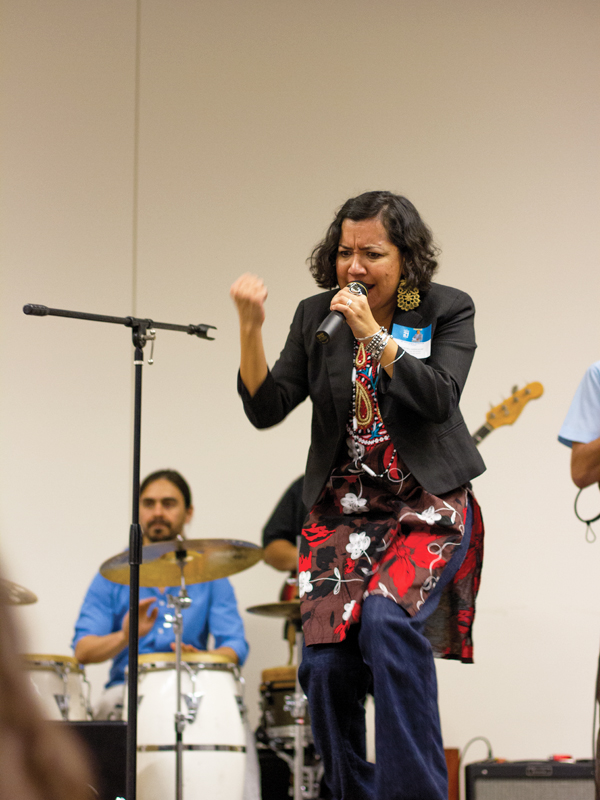
“We all have something to say. There is room para todos,” Erica Ocegueda says, smiling, the interest in her eyes encouraging the handful of people sitting with her to open up and tell their stories. There is room for everybody, she says, and everybody feels welcomed. As each person offers up the reasons for their connection to dance, she nods, her bunched hair bouncing in more than just acknowledgment, but understanding. She points to the people in the circle with her feet — she is a dancer.
“We all come with a variety of different dance forms,” Ocegueda reflects, as the music on the folklorico dancer’s iPod transitions from hip-hop to Bob Dylan. “It’s telling a story with our body,” and the circle of souls agrees.
Ocegueda was just one presenter at this year’s Tomas Rivera Conference, where people told their own stories through art and literature. Leading into a showing of “In the Heights,” the five-hour program featured no less than nine workshops and a turnout of nearly 200 people from UCR, the Riverside community and the Inland Empire. All of them came to the conference to be inspired, whether it was the attendees seeking inspiration from the master-class presenters, or the presenters seeking inspiration from the enthusiasm of the attendees.
“It’s all about the arts and education for social change. That was the inspiration,” Lisette Lasater, the first-ever Tomas Rivera Teaching Assistant, says. “I teach you, you teach me, where we learn from each other. It’s a way of making community.”
It’s easy to see that sense of community, even before the workshops begin and attendees are sitting through the opening ceremonies. Andy Melendrez, council member of the city of Riverside, is there. So is Abraham Zapata, who works at California State University, Northridge as an undergraduate advisor for art majors. He’s sitting next to his sister, Valarie, who graduated from UCR with a Ph.D. in 2003. Elementary school teachers from neighboring cities are present. Volunteers from Chicano Student Programs (CSP) serve as “ambassadors” and guide people from place to place during the event.
When lunch is announced, students are the first to stream into the room, forming two lines that wrap around the walls of HUB 302. There’s a steady murmur of voices from people as they open conversation with people they’ve met for the first time, but who share a passion for community engagement. That passion — a swirling torrent of desire to make change — soon bursts through to become a whirling maelstrom of energy as the Grammy-winning band Quetzal begins to release roiling waves of music through the HUB.
“Estoy aqui! Estoy aqui!” lead singer Martha Gonzales chants to a backdrop of frenzied guitar and percussive beats in an affirming anthem of existence. Those words, “I am here,” reverberate through the room, emanate from the speakers and bounce off the walls. They envelop the area, and are echoed by the entire room in a single great mosaic of voice.
At one point during the performance, the mic goes out. But Gonzalez does not throw her hands up in frustration. Gracefully ascending to the top of a wooden crate, she speaks through her feet — stomping, pounding, her heels generating staccato taps as the band carries on. The voice from her mouth is not the only one she has, and the crowd cheers and claps. She is heard. She is here.
When lunch ends, people disperse to their individual workshops. But the energy does not dissipate. Almost 30 people attend “Hip Hop Theatre of Social Change,” but the dynamism and movement in the room makes it feel as if everybody from UCR is dancing together. Jose Joaquin Garcia pushes people out of their comfort zone as he teaches them the art of hip-hop. Some are like young foals, learning to stand; others are veterans. Everyone learns, and by the end of the workshop, cries of praise peal out like bells toward the heavens. “Alabanza!”
In other workshops, the energy comes from the stories of the presenters. Gabriela Valle talks about the time her mother seated a gay married couple together at her Christmas table — something not even their own families would do for them. Fabian Debora, an artist who is teaching children from underserved communities the value of art, spins the yarn of a boy who was a troublemaker in class. He asks the audience if people should give up on the student, then shakes his head. “I’m going to hug him tighter,” he affirms.
Jorge Huerta is a high-energy man who is the first Latino to earn a Ph.D. in art in the country, and comments in his introduction to a darkened room, “You cannot know where you’re going if you don’t know where you’ve been.” So he shows the audience where they’ve been, detailing the portrayal of Latinos in literature throughout history. His specialty is theatre, and his enthusiasm is incredible as he darts to and fro, looking directly into the eyes of audience members. Light from the projector reflecting off his glasses, he re-enacts the play “Los Vendidos” entirely from heart, and, hands gesturing and arms outstretched, explains the struggle of being Latino. “When I was growing up … I didn’t want to be a Mexican,” he says. But Huerta now embraces that identity and draws power from it.
Gradually, as the workshops draw to a close, people trickle back to the upper floor of the HUB, excited and animated as they discuss their experiences with their newly made companions in empowerment. “Everyone gave their own input, and everyone contributed,” says third-year creative writing major Stephanie Gomez-Hernandez as she prepares to share her workshop experience with the rest of the conference. Edwin Siguenza graduated from UCR with a degree in theatre last year — but this is his first Tomas Rivera Conference. He’s here because he wants to show others “what the arts are all about, how liberating they can be … I want to share that with other kids.”
Earlier, the workshop presenters took to the stage to describe their workshops. Now it is the participants’ turn, as they glide up to the podium to express their legitimacy of self. Some express it through dance. Others present a collaborative poster. Still others speak directly about their own challenges and triumphs. The audience is energized from the collective outpouring of experiences, their clapping reaching a crescendo like a wave crashing onto a beach.
The final group pools their voices together to generate an original song, created in just an hour and a half, but born from several lifetimes of experiences. The people sitting and watching join the stream of voices, matching the beat with their hands, no longer just an audience but part of a river the size of the Nile, marching endlessly onward toward the sea.
“Dignity, our victory. Venceremos. Dignity, our victory. Venceremos!” The words flood the room. We will overcome, they say. And just as all rivers reach the ocean, it seems inevitable that the participants of the Tomas Rivera Conference will overcome too.








